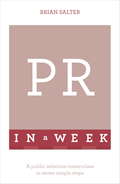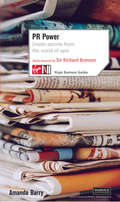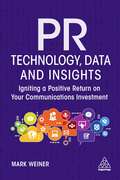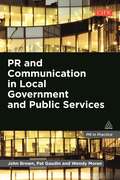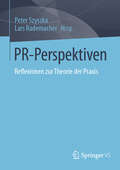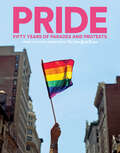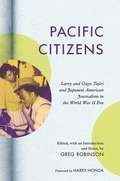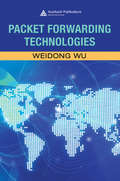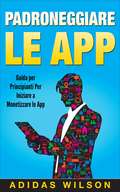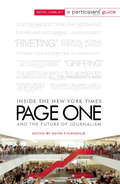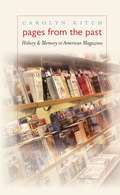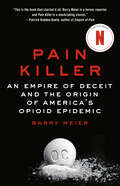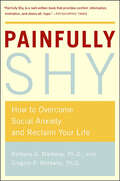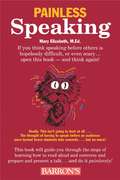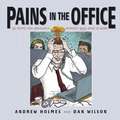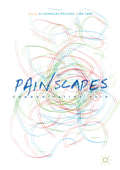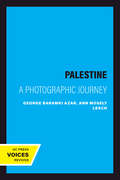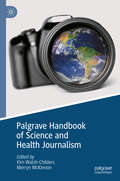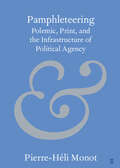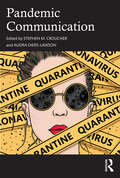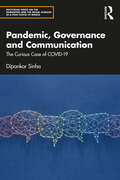- Table View
- List View
PR In A Week: A Public Relations Masterclass In Seven Simple Steps
by Brian SalterBrilliant PR just got easierYou are about to discover everything you need to know about Public Relations. PR is the practice of conveying messages to the public with the intention of changing the public's actions by influencing their opinions. By targeting different audiences with different messages to achieve an overall goal, PR practitioners can achieve widespread opinion and behavioural change.Communications is seen as being a key element in business, with PR experts increasingly called on to advise senior management on appropriate communications strategies, before decisions are made, rather than being called on to defend them after they have been made. But PR is not just for self-conscious organizations. If you are looking for a job or an in-house promotion; or if you are trying to publicize a fundraiser for your local charity; if you're trying to advance a cause, or you want others to appreciate your point of view, you need your voice to be heard.Nowadays there is a veritable plethora of communication channels available, ranging from traditional newspapers and magazines to online outlets including ezines, social networking sites and blogs. Some of these are good in some situations, but hopeless in others. Throughout this book we will be concentrating on how we can effect the flow of information and how we can achieve the desired mindset change in our target audiences.- Sunday: Who needs PR- Monday: External audiences- Tuesday: Dealing with the media- Wednesday: Social Media- Thursday: Practical pointers for powerful press releases- Friday: Marketing communications- Saturday: Internal PR
PR Power: Inside Secrets From the World of Spin
by Amanda BarryWhether you're just starting out or have been in business for years, it's never too late to start harnessing the incredible power of public relations. PR Power offers advice on how to get the most from your PR consultancy or in-house team and what to do if you're running the PR yourself, with:* practical hints and tips* toolkit exercises* case studies from real businesses* priceless advice from leading experts in PR
PR Technology, Data and Insights: Igniting a Positive Return on Your Communications Investment
by Mark WeinerData, technology and insights have forever changed the public relations and corporate communications function. Failure to adapt is more a matter of willingness than inability.Now, technology, data and insights inform more meaningful objectives and elevate performance evaluation. The result is a positive return on PR investment, reduced reputational risk and optimal efficiency. By ignoring these essential assets, PR professionals risk losing executive attention and organizational investment. While "building buzz" or "breaking through the media clutter" may have been adequate measures of success in the past, the top executives who fund and evaluate corporate communications expect much more, including a quantifiable and positive return on PR investment.Leaders assume that corporate communications and PR professionals already understand the fundamentals of business, and they expect an ability to contextualize PR objectives, outputs and outcomes in the language of business. PR Technology, Data and Insights helps communications professionals understand the purpose-built technologies, data assets and actionable insights available to them while sharing best practices to apply these assets for improved PR performance over time, versus objectives and against competitors.Using case studies from industries as varied as financial services, technology, travel, automotive and more, along with best practice examples from Adobe, Mastercard, Southwest, Ford and other world class organizations, PR Technology, Data and Insights shows professional communicators how to optimize technology, lead with data, quantify PR's ability to convert public relations outputs to business outcomes, and deliver insights that empower executive decision-making.
PR and Communication in Local Government and Public Services
by Wendy Moran John Brown Pat GaudinA practical and accessible text on both internal and external communication for those working in local councils and in the provision of public services, this book offers a detailed analysis of the issues that are unique to this challenging and fast-moving environment. In the UK's current climate of budget cuts and policy changes, local government officials need to be aware of best practice in both broadcasting their services and responding to crises in their communities. Given changes in the media - from the rise of social communications such as Twitter and Facebook, through to web access for older consumers - how can local councils convey their key messages to best effect? And how can a council's "brand" be built and protected? PR and Communication in Local Government and Public Services reinforces the importance of effective and meaningful communication to both local democracy and the planning and delivery of quality services.
PR for Anyone: 100+ Affordable Ways to Easily Create Buzz for Your Business
by Christina DavesThe do-it-yourself guide to getting publicity for your business—without a big budget! Christina Daves, founder of PR for Anyone, knows how to get a business noticed without breaking the bank. In this book, she reveals how she appeared in over fifty media outlets in one year—including The Steve Harvey Show, Dr. Oz, NBC, FOX, CBS, Parenting Magazine, the Washington Post and more. And for other entrepreneurs trying to make an impression on potential customers or clients, she also offers expert advice on how to: * Brand your business so your message is consistent * Get FREE media exposure! * Share your message with journalists in a timely, effective way * Find the right people and places to get results * and much more &“Lays out the exact steps you must take to become a media master and secure massive exposure . . . priceless.&” —Steve Olsher, New York Times–bestselling author of What&’s Your WHAT
PR für vegane und nachhaltige Produkte: Presse- und Öffentlichkeitsarbeit für Unternehmen und Startups mit Purpose
by Katrin KasperDieses Buch zeigt, wie Unternehmen vegane und nachhaltige Produkte oder Dienstleistungen vermarkten und kommunizieren können. Denn Veränderungen hin zu mehr Nachhaltigkeit können nur gelingen, wenn Menschen überzeugt und begeistert werden – Verbote hingegen sind eher kontraproduktiv. Wie also können „Veggie“-Produkte den Konsumenten schmackhaft gemacht werden? Wie lassen sich nachhaltige Marken authentisch positionieren? Und was tun, wenn die Ideale groß, die Budgets aber klein sind? Katrin Kasper zeigt, wie man mit Storytelling, überraschenden PR-Aktionen und professioneller Pressearbeit die Wahrnehmung der Menschen beeinflussen und das Konsumverhalten langfristig positiv verändern kann – und dabei ganz nebenbei die Welt verbessert.
PR und Organisationskommunikation im Gesundheitswesen: Interdisziplinäre Perspektiven auf Wertehorizonte und deren Spannungsfelder
by Doreen ReifegersteDas Gesundheitssystem ist geprägt von medizinischen, gemeinwohlorientierten und ökonomischen Interessen. Diese Zielgrößen sind dabei vor dem Hintergrund gesellschaftlicher und systembezogener Wandlungsprozesse wie der Patientenorientierung und Digitalisierung zu bewerten. In der Gesamtschau ergibt dies ein Spannungsfeld konkurrierender und komplementärer Ziele in der internen und externen Kommunikation von Kliniken, Pharmaunternehmen, Krankenversicherungen und einzelner Akteure des Gesundheitswesens. Auf dieses Spannungsfeld geht dieser Band ein und integriert dabei die Perspektiven der PR-und Organisationskommunikation sowie der Gesundheitskommunikation.
PR-Perspektiven: Reflexionen zur Theorie der Praxis
by Lars Rademacher Peter SzyszkaMit seinen Beiträgen wendet sich der Band bewusst gegen Mainstream-Positionen in Wissenschaft und Praxis rund um Public Relations. Die teilweise essayistische Form der Beiträge wurde bewusst gewählt, um einen kreativeren Umgang der Mitwirkenden mit ihren jeweils ausgewählten Gegenständen zu erleichtern. Die Auswahl orientiert sich an Themenfeldern, die in enger Verbindung mit dem Wirken von Klaus Kocks zwischen Wissenschaft und Praxis stehen.Herausgekommen sind zwölf theoretische Reflexionen von Praxis, die der Provokation des Einleitungsbeitrages folgend bekannte Themen neu oder anders denken und deren Durchdringung in weiterführenden Diskussionen herausfordern.
PRIDE: Fifty Years of Parades and Protests from the Photo Archives of the New York Times
by Adam Nagourney The New York TimesA stunning fifty-year visual history of LGBTQ pride marches, parades, and protests, taken from the New York Times photo archives.It began in New York City on June 28, 1969. When police raided the Stonewall Inn—a bar in the Greenwich Village neighborhood, known as a safe haven for gay men—violent demonstrations and protests broke out in response. The Stonewall Riots, as they would come to be known, were the first spark in the wildfire that would become the LGBTQ rights revolution. Fifty years later, the LGBTQ community and its supporters continue to gather every June to commemorate this historic event. Here, collected for the first time by The New York Times, is a powerful visual history of five decades of parades and protests of the LGBTQ rights movement. These photos, paired with descriptions of major events from each decade as well as selected reporting from The Times, showcase the victories, setbacks, and ongoing struggles for the LGBTQ community.“To take in the breadth of [PRIDE’s] contents—to see the scope of LGBTQ+ rights, from the first Christopher Street Day march in 1970 to protests for transgender rights just last year—is to witness the power of visibility firsthand.” —them.“This book is a powerful visual history of five decades of parades and protests for equality. Educational and visually enriching, complete with photos from The New York Times, this book is the perfect companion for any coffee table.” —BookTrib
PRIMA 2016: Princiles and Practice of Multi-Agent Systems
by Matteo Baldoni Amit K. Chopra Tran Cao Son Katsutoshi Hirayama Paolo TorroniThis book constitutes the refereed proceedings of the 19th International Conference on Principles and Practice of Multi-Agent Systems, PRIMA 2016, held in Phuket, Thailand, in August 22-26, 2016. The 16 revised full papers presented together with two invited papers, 9 short papers and three extended abstracts were carefully reviewed and selected from 50 submissions. The intention of the papers is to showcase research in several domains, ranging from foundations of agent theory and engineering aspects of agent systems, to emerging interdisciplinary areas of agent-based research.
Pacific Citizens: Larry and Guyo Tajiri and Japanese American Journalism in the World War II Era
by Greg Robinson Harry HondaOffering a window into a critical era in Japanese American life, Pacific Citizens collects key writings of Larry S. Tajiri, a multitalented journalist, essayist, and popular culture maven. He and his wife, Guyo, who worked by his side, became leading figures in Nisei political life as the central purveyors of news for and about Japanese Americans during World War II, both those confined in government camps and others outside. The Tajiris made the community newspaper the Pacific Citizen a forum for liberal and progressive views on politics, civil rights, and democracy, insightfully addressing issues of assimilation, multiracialism, and U.S. foreign relations. Through his editorship of the Pacific Citizen as well as in articles and columns in outside media, Larry Tajiri became the Japanese American community's most visible spokesperson, articulating a broad vision of Nisei identity to a varied audience. In this thoughtfully framed and annotated volume, Greg Robinson interprets and examines the contributions of the Tajiris through a selection of writings, columns, editorials, and correspondence from before, during, and after the war. Pacific Citizens contextualizes the Tajiris' output, providing a telling portrait of these two dedicated journalists and serving as a reminder of the public value of the ethnic community press.
Packet Forwarding Technologies
by Weidong WuAs Internet traffic continues to grow exponentially, there is a great need to build Internet protocol (IP) routers with high-speed and high-capacity packet networking capabilities. The first book to explore this subject, Packet Forwarding Technologies explains in depth packet forwarding concepts and implementation technologies. It covers the
Padroneggiare le App: Guida per Principianti Per Iniziare a Monetizzare le App
by Adidas WilsonLe tecnologie di comunicazione sono in costante progresso per stare al passo coi tempi. Le app di messaggistica vanno alla grande ora. Stanno prendendo completamente il sopravvento sui social media, diventando il modo principale con cui comunichiamo online Quando la maggior parte degli imprenditori comincia, inizia a leggere articoli su “come fare il botto con la tua prima app”, “creare l’app da miliardi di dollari”, e la maggior parte dei libri riguardanti questo argomento. Sono attaccati a questa versione dei fatti, ma ciechi di fronte all’altra. Per ottenere la tua storia di successo, devi scoprire perché le altre app falliscono. L’amara verità è che ci sono più app fallite che di successo.
Page One: Inside The New York Times and the Future of Journalism
by Participant Media David FolkenflikThe news media is in the middle of a revolution. Old certainties have been shoved aside by new entities such as WikiLeaks and Gawker, Politico and the Huffington Post. But where, in all this digital innovation, is the future of great journalism? Is there a difference between an opinion column and a blog, a reporter and a social networker? Who curates the news, or should it be streamed unimpeded by editorial influence? Expanding on Andrew RossiOCOs ?rivetingOCO film ("Slate"), David Folkenflik has convened some of the smartest media savants to talk about the present and the future of news. Behind all the debate is the presence of the New York Times, and the inside story of its attempt to navigate the new world, embracing the immediacy of the web without straying from a commitment to accurate reporting and analysis that provides the paper with its own definition of what it is there to showcase: all the news thatOCOs fit to print. "
Pages from the Past
by Carolyn KitchAmerican popular magazines play a role in our culture similar to that of public historians, Carolyn Kitch contends. Drawing on evidence from the pages of more than sixty magazines, including Newsweek, Rolling Stone, Black Enterprise, Ladies' Home Journal, and Reader's Digest, Kitch examines the role of journalism in creating collective memory and identity for Americans. Editorial perspectives, visual and narrative content, and the tangibility and keepsake qualities of magazines make them key repositories of American memory, Kitch argues. She discusses anniversary celebrations that assess the passage of time; the role of race in counter-memory; the lasting meaning of celebrities who are mourned in the media; cyclical representations of generational identity, from the Greatest Generation to Generation X; and anticipated memory in commemoration after crisis events such as those of September 11, 2001. Bringing a critically neglected form of journalism to the forefront, Kitch demonstrates that magazines play a special role in creating narratives of the past that reflect and inform who we are now.
Pain Killer: An Empire of Deceit and the Origin of America's Opioid Epidemic
by Barry Meier“Groundbreaking . . . the shocking account of the origins of today's opioid epidemic, the creators of this plague, and the way to help stop it.”—Sam Quinones, author of Dreamland: The True Tale of America’s Opiate Epidemic“Prescient . . . a landmark work of investigative journalism.”—David A. Kessler, former commissioner of the Food and Drug Administration and author of The End of Overeating Between 1999 and 2017, an estimated 250,000 Americans died from overdoses involving prescription painkillers, a plague ignited by Purdue Pharma’s aggressive marketing of OxyContin. Families, working class and wealthy, have been torn apart, businesses destroyed, and public officials pushed to the brink. In Pain Killer, Pulitzer Prize–winning New York Times reporter Barry Meier exposes the roots of the most pressing health epidemic of the twenty-first century. Powerful narcotic painkillers, or opioids, were once used as drugs of last resort for pain sufferers. Purdue turned OxyContin into a billion-dollar blockbuster by launching an unprecedented marketing campaign claiming that the drug’s long-acting formulation made it safer to use than traditional painkillers for many types of pain. That illusion was quickly shattered as drug abusers learned that crushing an Oxy could release its narcotic payload all at once. Even in its prescribed form, Oxy proved fiercely addictive. As OxyContin’s use and abuse grew, Purdue concealed what it knew from regulators, doctors, and patients. Here are the people who profited from the crisis and those who paid the price, those who plotted in boardrooms and those who tried to sound alarm bells. A country doctor in rural Virginia, Art Van Zee, took on Purdue and warned officials about OxyContin abuse. An ebullient high school cheerleader, Lindsey Myers, was reduced to stealing from her parents to feed her escalating Oxy habit. A hard-charging DEA official, Laura Nagel, tried to hold Purdue executives to account. The drugmaker’s owners, Raymond and Mortimer Sackler, whose names adorn museums worldwide, made enormous fortunes from the commercial success of OxyContin. In this updated edition of Pain Killer, Barry Meier breaks new ground in his decades-long investigation into the opioid epidemic. He takes readers inside Purdue to show how long the company withheld information about the abuse of OxyContin and gives a shocking account of the Justice Department’s failure to alter the trajectory of the opioid epidemic and protect thousands of lives. Equal parts crime thriller, medical detective story, and business exposé, Pain Killer is a hard-hitting look at how a supposed wonder drug became the gateway drug to a national tragedy.
Painfully Shy: How to Overcome Social Anxiety and Reclaim Your Life
by Barbara Markway Gregory P. MarkwayQuestion:* Do you feel shy and self-conscious in social situations?* Are you plagued with self-doubts about how you come across to others?* Do you feel physically sick with worry about certain situations that involve interacting with others?* Do you make excuses, or even lie to avoid the social situations you dread?* Do you make important decisions based on whether you'll have to participate in groups or speak in front of others?If you answered yes to any of these questions, you're not alone. Millions of people experience social anxiety of painful shyness to such a degree that it disrupts their daily lives. In fact, as many as one out of every eight Americans will at some point suffer from what's called social anxiety disorder, or social phobia. Social anxiety disorder is a real problem. But fortunately, it's also one that can be overcome. Drs. Barbara and Greg Markway, psychologists and experts in the field, coach you every step of the way in this warm, easy-to-read, and inspiring book. You'll learn how social anxiety disorder develops, how it affects all aspects of your life, and most importantly, how to chart your course to recovery.
Painless Speaking
by Mary ElizabethDesigned for use in middle school and high school classrooms, as well as at home, books in this series transform subjects that are normally dreaded by many students. "Painless" books take light-hearted approaches to their subjects, while addressing topics that classroom texts never get to. "Painless Speaking" explores the uniquely human act of oral communication, including elements in our culture that shape the way we speak. It explores finding one's voice, understanding the basic unit of speech communication (an utterance), learning the art of conversation, reading aloud from fiction and nonfiction texts, and instruction in public speaking, which entails composing, practicing, and delivering a speech. Students will find guidelines for self-evaluation of a public speech.
Pains in the Office
by Daniel Wilson Andrew HolmesWhat could be worse than being stuck in an office all day? Meetings, deadlines. . . colleagues. Surely no torture can crush the spirit so completely as prolonged exposure to these people. You?ve faked phone calls to avoid them. You?ve hidden in toilet cubicles until they?ve gone away. At last there?s an effective way to fight back. Pains in the Office will help you identify, shun and plan your revenge on the 50 worst types of people you meet at work. Your job may be awful, you may hate your colleagues with a passion, but here at least is a happy place to retreat into. This is your comfort blanket, hidey-hole and fire escape all rolled into one. Pains in the Office is guaranteed to become as indispensable to the office worker as cigarette breaks and free stationery. It?s the perfect antidote to nightmarish co-workers everywhere!
Painscapes
by Ej Gonzalez-Polledo Jen TarrThis book brings into dialogue approaches from anthropology, sociology, visual art, theatre, and literature to question what kinds of relations, frames and politics constitute pain across disciplines and methodologies. Each chapter offers a unique window onto the notoriously difficult problem of how pain is defined and communicated. The contributors reimagine the value of images and photography, poetry, history, drama, stories and interviews, not as 'better' representations of the pain experience, but as devices to navigate the complexity of pain across different physical, social, and intersubjective domains. This innovative collection provides a new access point to the phenomenon of pain and the materialities, affects, structures and institutions that constitute it. This book will appeal to readers seeking to better understand pain's complexity and the social and affective ecologies through which pain is known, communicated and lived.
Palestine: A Photographic Journey
by George Baramki AzarThis title is part of UC Press's Voices Revived program, which commemorates University of California Press’s mission to seek out and cultivate the brightest minds and give them voice, reach, and impact. Drawing on a backlist dating to 1893, Voices Revived makes high-quality, peer-reviewed scholarship accessible once again using print-on-demand technology. This title was originally published in 1991.
Palgrave Handbook of Science and Health Journalism
by Kim Walsh-Childers Merryn McKinnonThis handbook reviews the extant literature on the most important issues in health and science journalism, with a focus on summarizing the relevant research and identifying key questions that are yet to be answered. It explores challenges and best practices in health and science reporting, formats and audiences, key topics such as climate change, pandemics and space science, and the ethics and political impacts of science and health journalist practice. With numerous international contributions, it provides a comprehensive overview of an emerging area of journalism studies and science communication.
Pamphleteering: Polemic, Print, and the Infrastructure of Political Agency (Elements in Publishing and Book Culture)
by Pierre-Héli MonotThe 'Pamphlet Wars' of the seventeenth century, the activist texts of the Labour Movement, and the recent campaigns for climate justice have all drawn on the affordances of pamphleteering to advance their cause: pamphlets circulate across geographical boundaries and social divides, they attract a readership that is usually excluded from the classical public sphere, they can be produced at low cost, and they often provide anonymity to their authors. This Element provides a brief history of short-form polemical literature from the Reformation to the present. It argues that popular dissent and popular political agency must be understood in light of the material and, more recently, digital history of polemical literature. It makes the case that current online polemic is best understood as a late infrastructural transformation of classical and modern pamphleteering. This title is also available as Open Access on Cambridge Core.
Pandemic Communication
by Stephen M. Croucher Audra Diers-LawsonThis book details how the processes of communication are affected by the presence of a pandemic and establishes a research agenda for those effects across the broad field of communication studies. Through contributions from experts in communication subdisciplines such as crisis, organizational, interpersonal, health, intergroup, and intercultural, this book provides the reader with a comprehensive view of the emerging field of study "pandemic communication." Each chapter has four primary objectives to: (1) define critical issues for pandemic communication from its subdiscipline’s perspective, (2) examine how communication varies during pandemic(s), (3) provide examples of how pandemic(s) havefor affected communication, and (4) propose a research agenda to build pandemic communication theory. This book is suited to undergraduate or post-graduate courses or modules in communication studies across a variety of subdisciplines as well as a reference for researchers in the subject.
Pandemic, Governance and Communication: The Curious Case of COVID-19 (Routledge Series on the Humanities and the Social Sciences in a Post-COVID-19 World)
by Dipankar SinhaThis book focuses on what is arguably the most devastating phenomenon in the history of modern civilization, the COVID-19 pandemic. It shows how, on the one hand, the pandemic has exposed governments the world over to deal with a major health crisis; and, on the other, efforts by the ruling forces to enforce surveillance on people and disciplining them by maneuvering cutting-edge digital technology in the name of security and safety. Second, it explores how the mainstream versions of crisis communication and risk communication face huge challenges during a pandemic. Finally, it analyses how the pandemic propels an extraordinary expansion of infodemic — rapid spread of excessive quantities of misinformation and disinformation of the fake and false variety — and how social media in particular becomes its main tool in causing subversion of the prevalent information order. Engaging, comprehensive and accessible, this book will be of immense importance to scholars and researchers of politics, especially governance and political communication, communication studies, and public health management. It will be vital for public policy professionals, experts in thinktanks, career bureaucrats, and non-governmental organizations.
